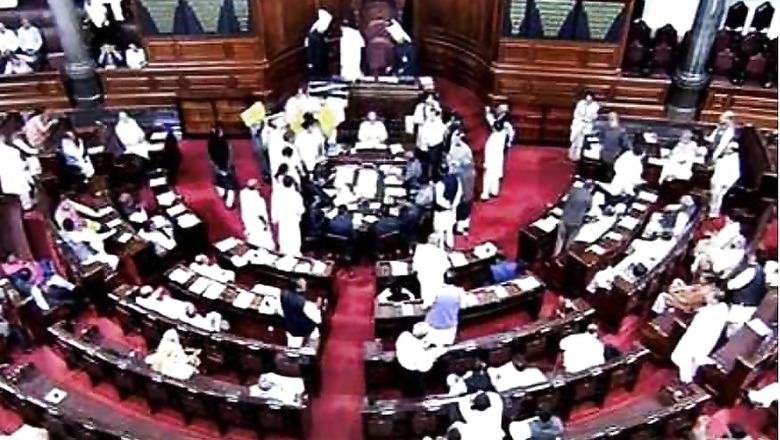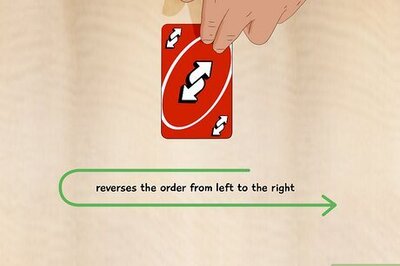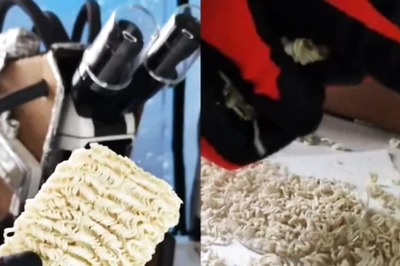
views
New Delhi: The Rajya Sabha on Wednesday cleared a bill to tighten road traffic regulations, such as the issuance of driving licence, and imposed stricter penalties for violations in an attempt to improve road safety around the country.
The Upper House passed the Motor Vehicles (Amendment) Bill, 2019, with 108 votes in favour and 13 against it, with three amendments moved by Union Road Transport and Highways Minister Nitin Gadkari. The legislation was passed by the Lok Sabha on July 23, but the bill will be sent back to it due to a typo.
The bill, which was pending for approval in the Rajya Sabha, had lapsed after the term of the 16th Lok Sabha ended.
Replying to a debate on the bill, Gadkari allayed concerns of states and said the Centre would not encroach on any of their rights, including a right to levy vehicle registration charge and permit fee besides posting of officials. Not a single rupee of state revenue would be taken by the Centre, he said. The rights of the states to set up driving training institutes will also not be tinkered with, he added.
The legislation provides for stricter punishment for various traffic-related offences as well as higher penalties, including compensation of Rs 5 lakh for death and Rs 2.5 lakh for grievous injury in an accident case.
Gadkari said the legislation will instill fear of law in people who violate traffic rules as an intelligent traffic system will monitor traffic offences. The minister said India was facing a shortage of 22 to 25 lakh drivers and to fill this gap, driver-training institutes have been planned across the country and the Centre was ready to provide Rs 1 crore subsidy for each.
Such centres are not only needed in metropolises like Delhi, Mumbai or Chennai, but in remote rural areas to uplift tribals and the poor, Gadkari said.
The minister also allayed fears of members regarding bringing in corporates, saying no rights were being given to companies.
Gadkari said the process for obtaining driving licenses would now be computerised and anyone, whether a minister or MP, will be able to procure licenses only after passing online tests. He said the government has no intention to intervene with the power of states and state transport corporations were free to run their buses.
Gadkari advocated the London transport model, stating that many state government undertakings had turned non-performing assets (NPAs) and the government was also exploring bringing in foreign funds.
Addressing a briefing after the session, Gadkari said, “This is not only a Motor Vehicle Act, but also a road safety bill. I believe it will cause a decline in accidents, the passing of this bill is a tribute to those who lost their lives in accidents.”
The bill proposes a National Transportation Policy for ushering in guidelines on the transportation of goods and passengers. The minister said it will be framed only after holding consultations with the states.
Once the bill becomes a law, the new vehicles will be registered at the level of dealers, which will eventually remove buyers' interface with the registration authorities.
The legislation proposes a fine of Rs 10,000 for not giving way to emergency vehicles and Rs 10,000 for driving despite disqualification. Aggregators violating driving licences will be fined up to Rs 1 lakh. It includes penalties in the range of Rs 1,000-Rs 2,000 for overspeeding.
The proposals are based on the recommendations of transport ministers from 18 states, which were vetted by a standing committee of Parliament.
Driving without insurance will be punishable with Rs 2,000 fine, while driving without helmets will attract Rs 1,000 penalty and a three-month suspension of licence. The guardian or owner will be deemed guilty in case of a road offence by juveniles and the registration of the vehicle will be cancelled.
Traffic violations will now attract a penalty of Rs 500 in place of Rs 100 earlier, while disobedience of orders of authorities will attract a minimum penalty of Rs 2,000 in place of Rs 500 earlier.
Participating in the debate in the Rajya Sabha, MPs had raised concerns over the growing number of road accidents and said there should be a compensation mechanism for the deceased.
The Congress alleged that the Centre has "hoodwinked" the Rajya Sabha on the bill as it was "defective" and not in the form passed in the Lok Sabha last week.
(With inputs from agencies)


















Comments
0 comment